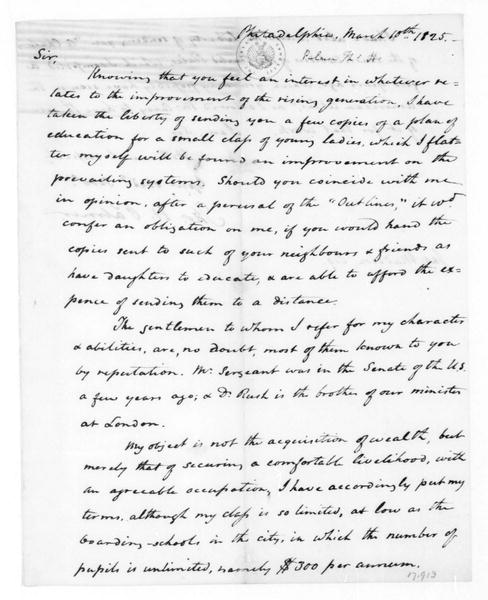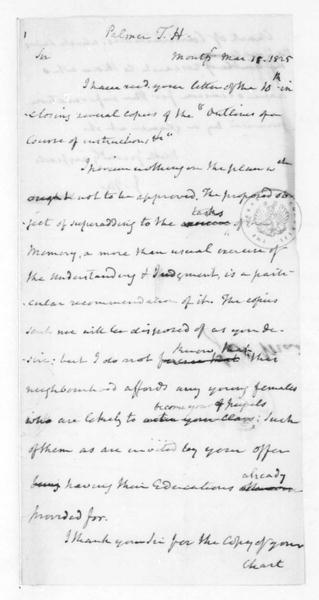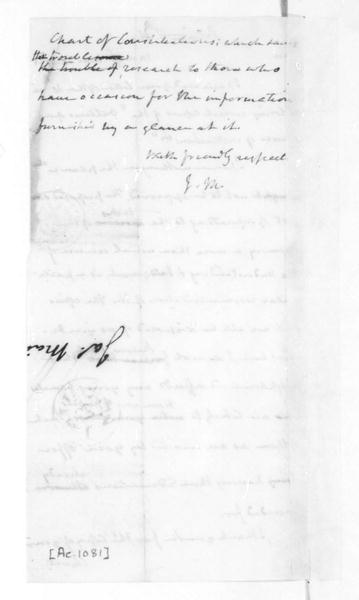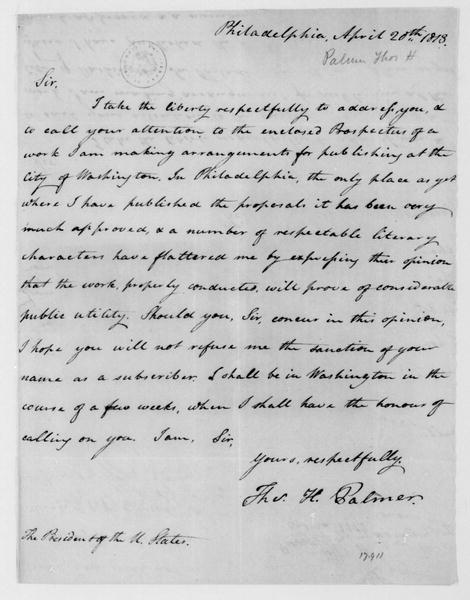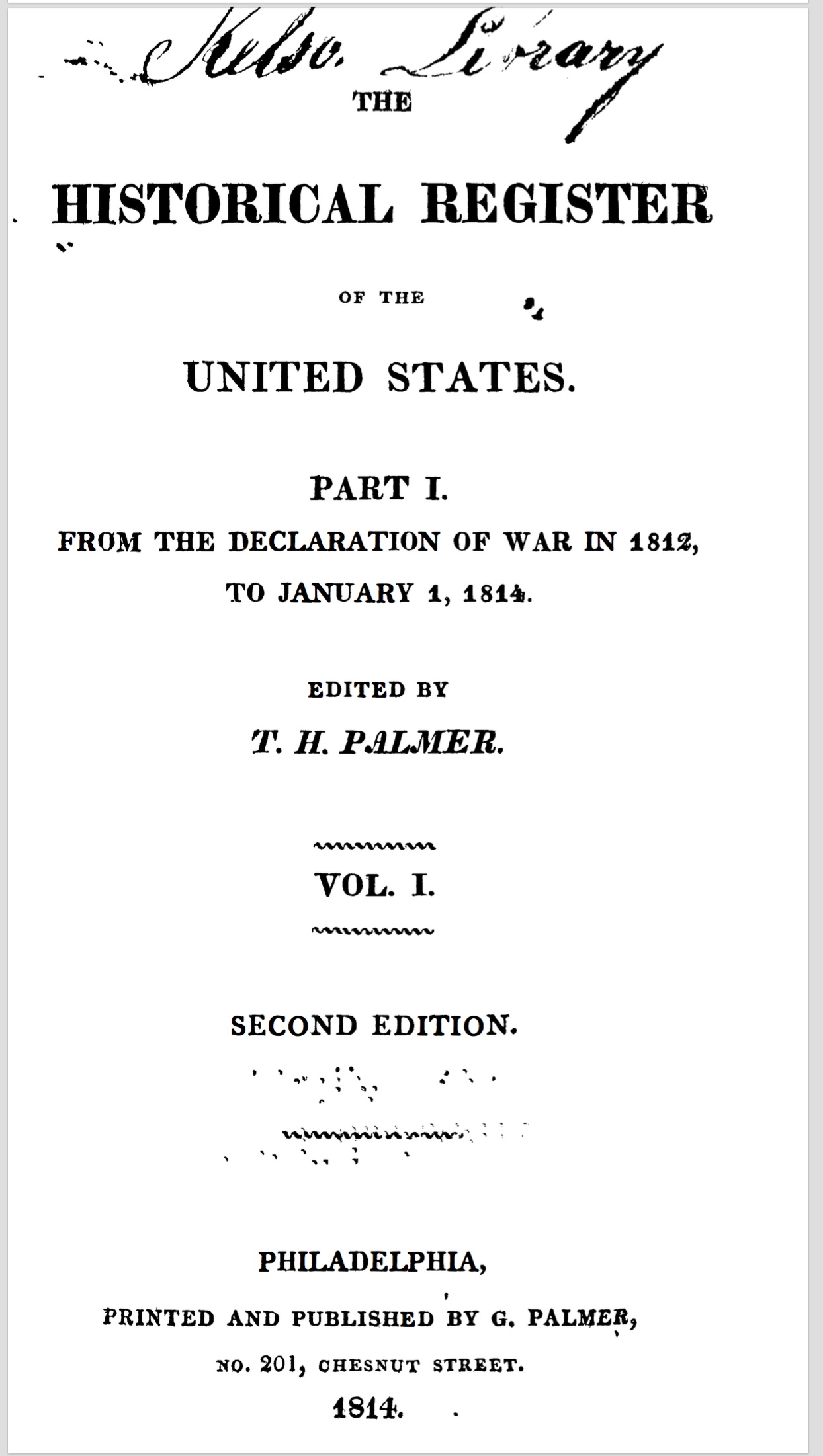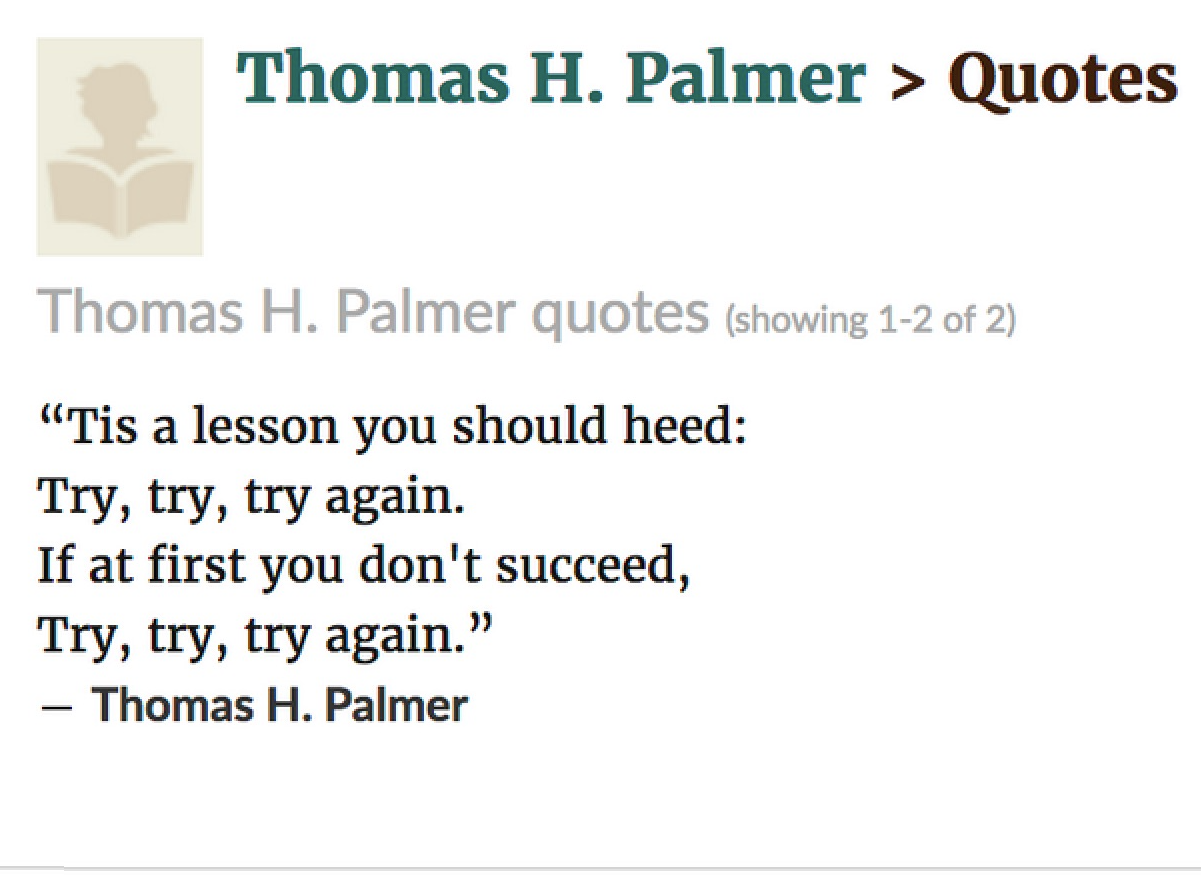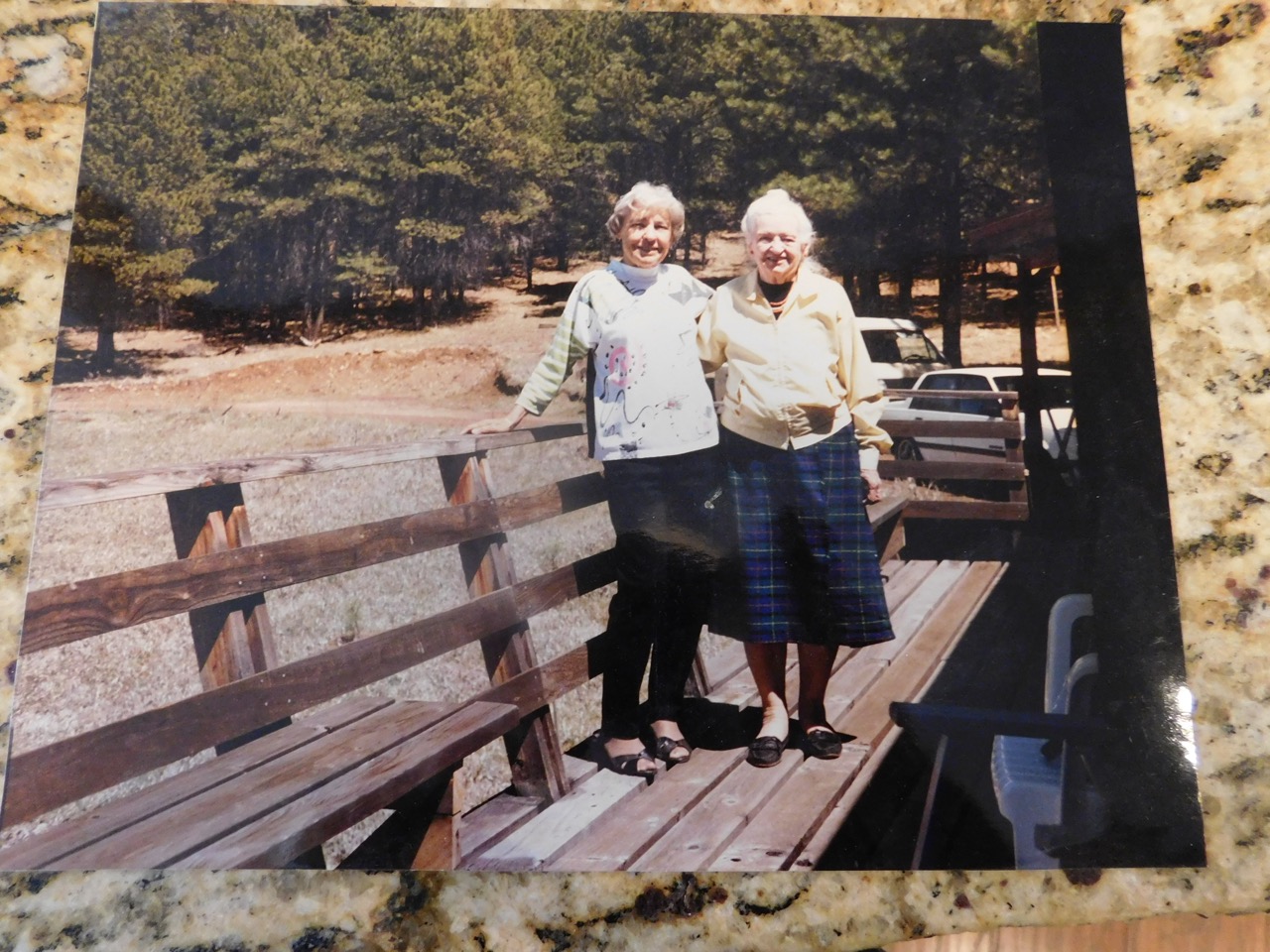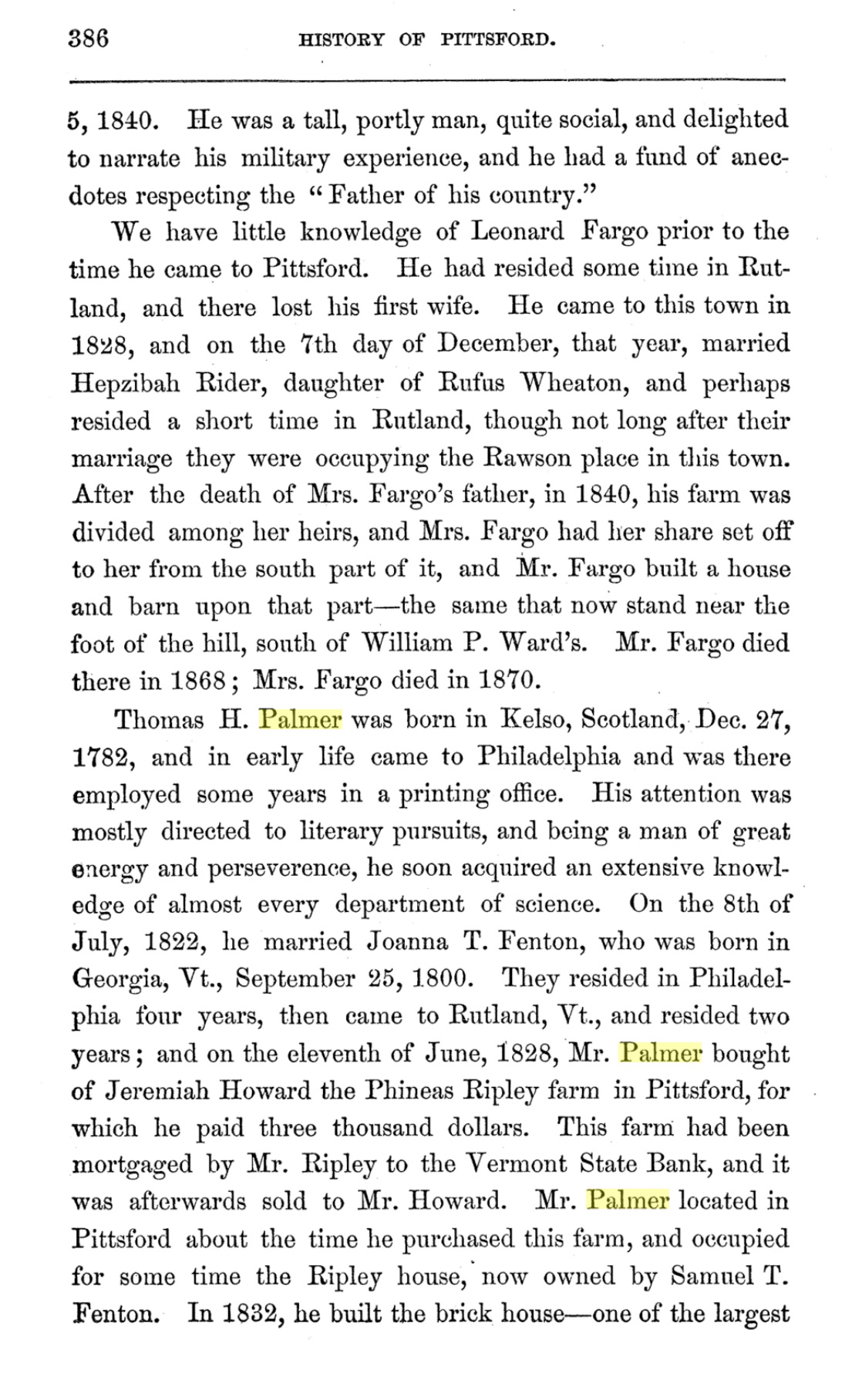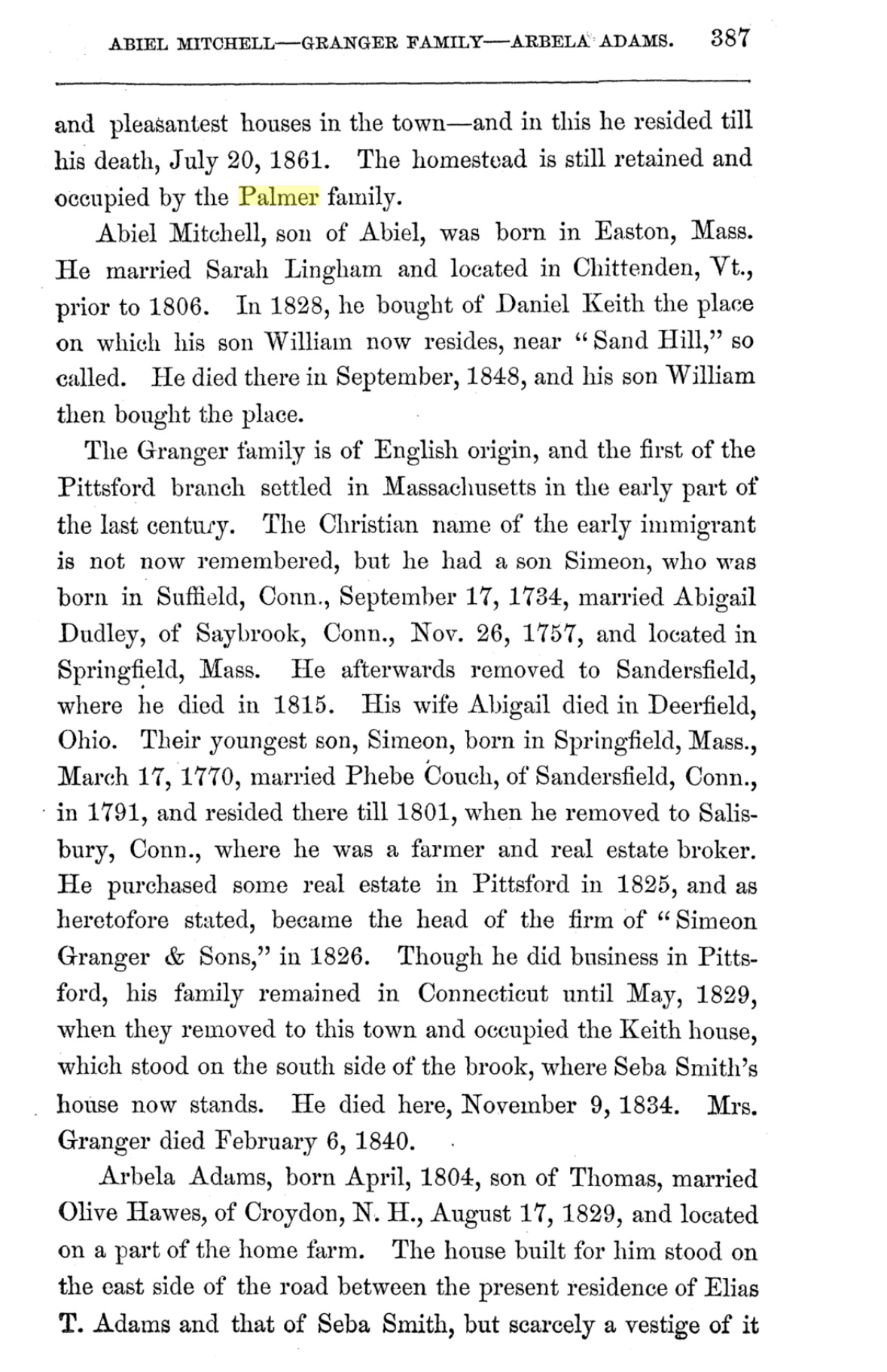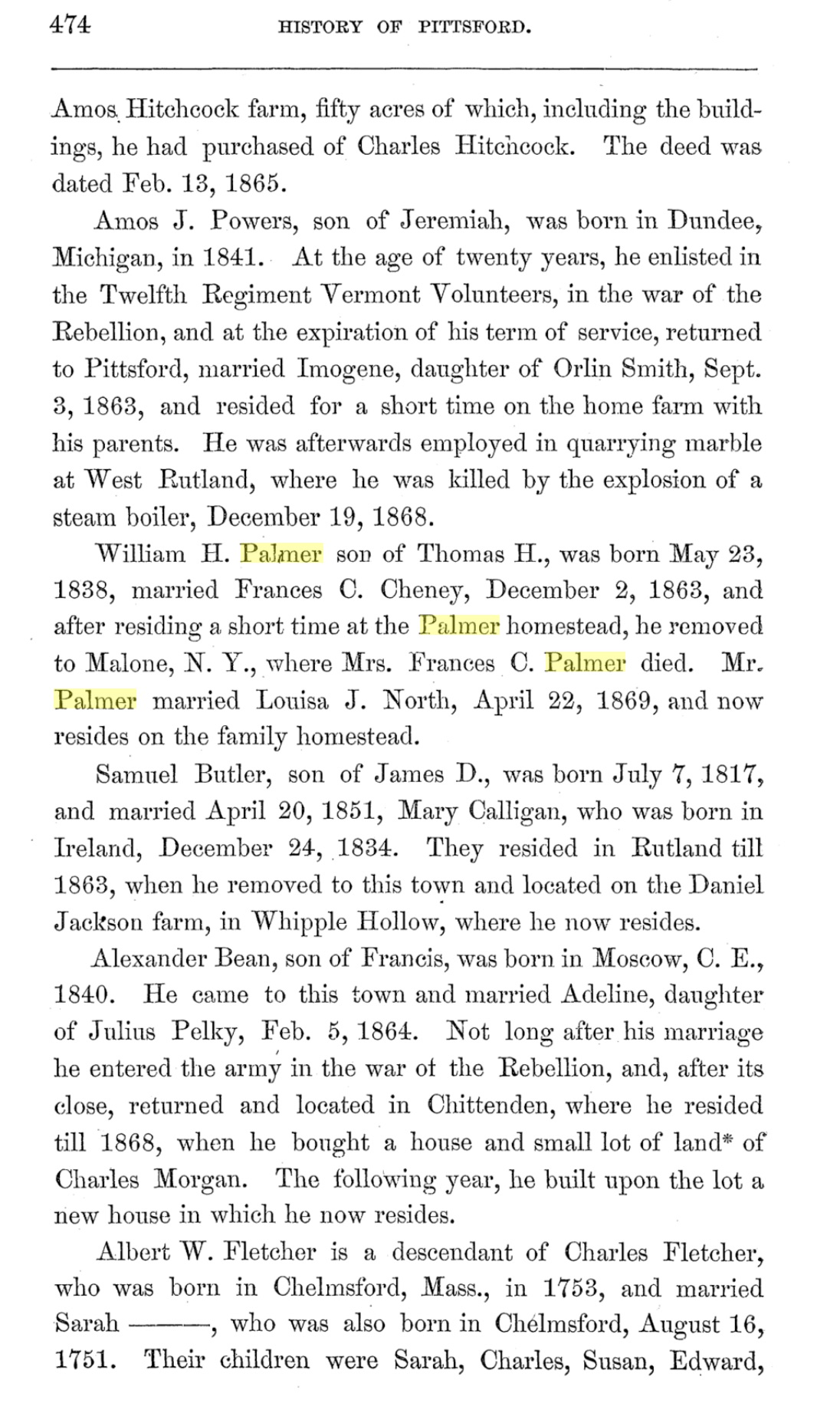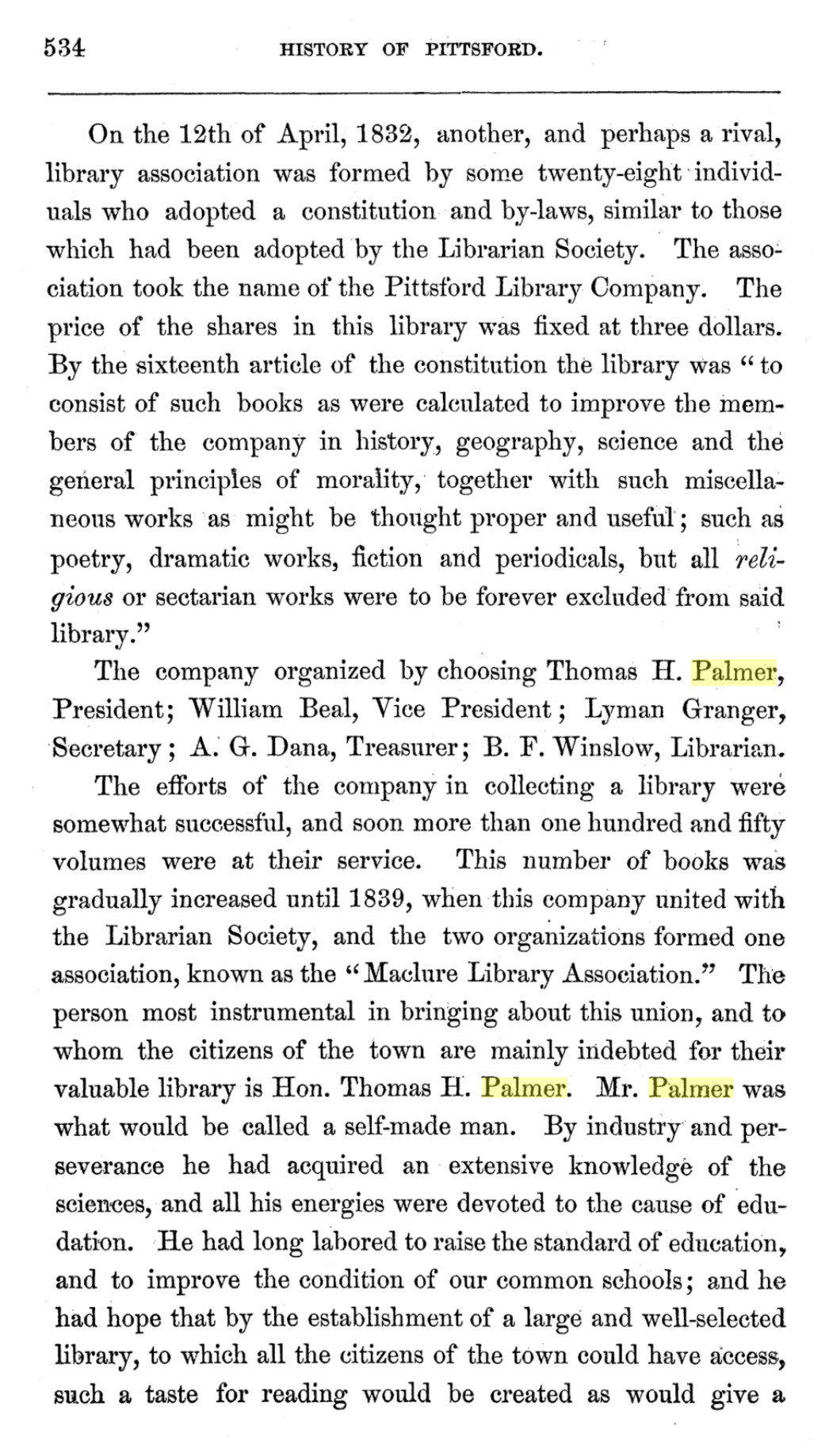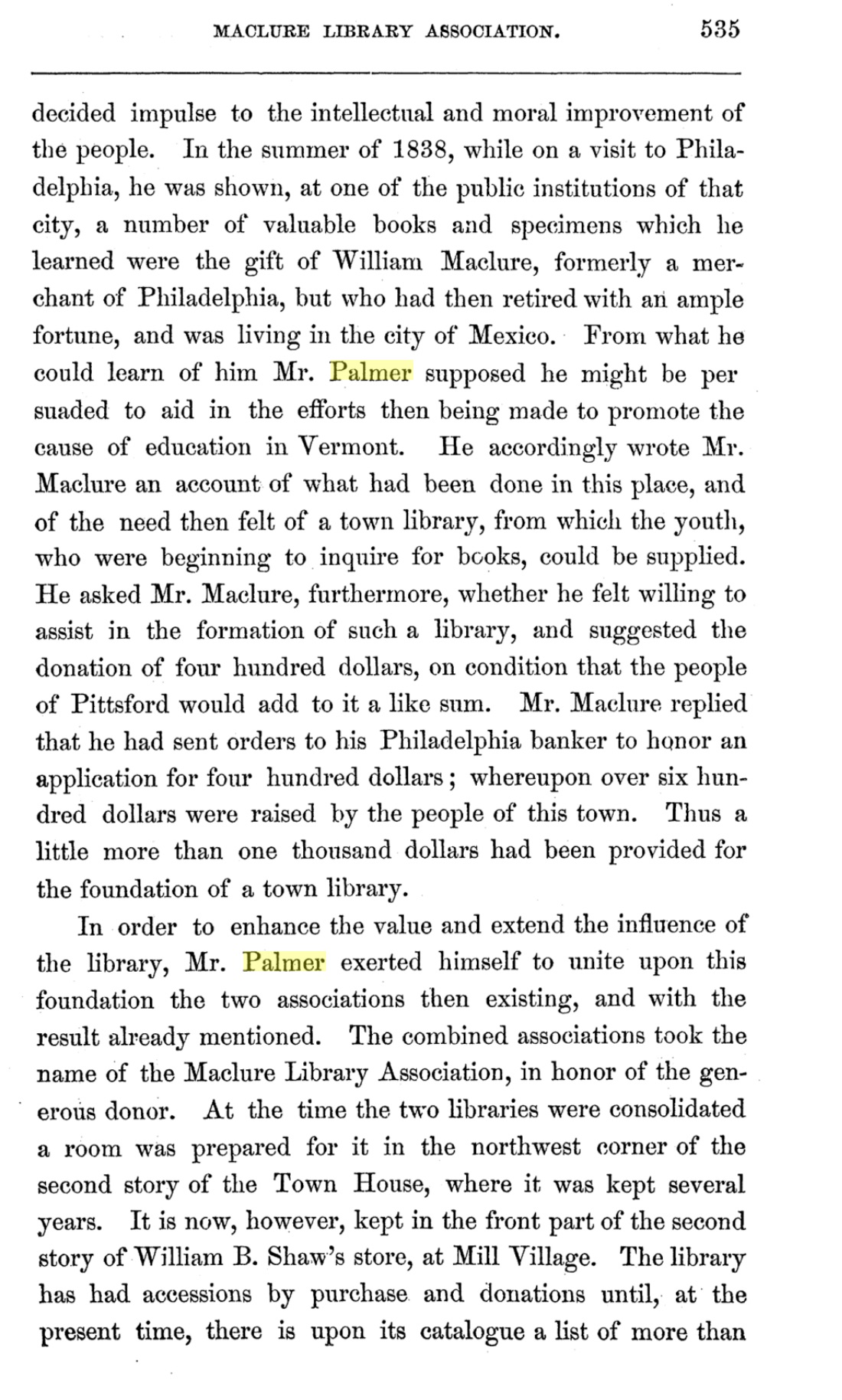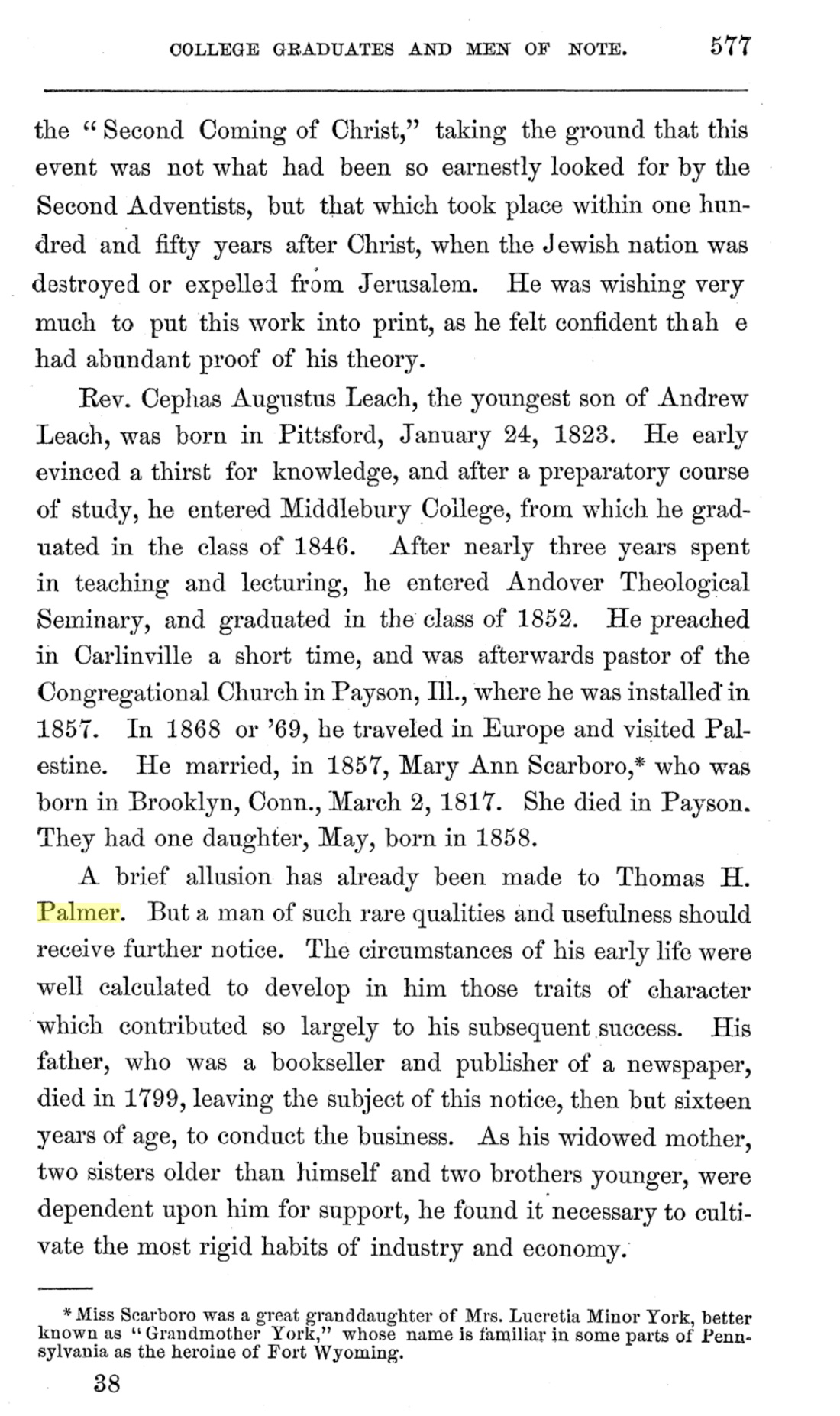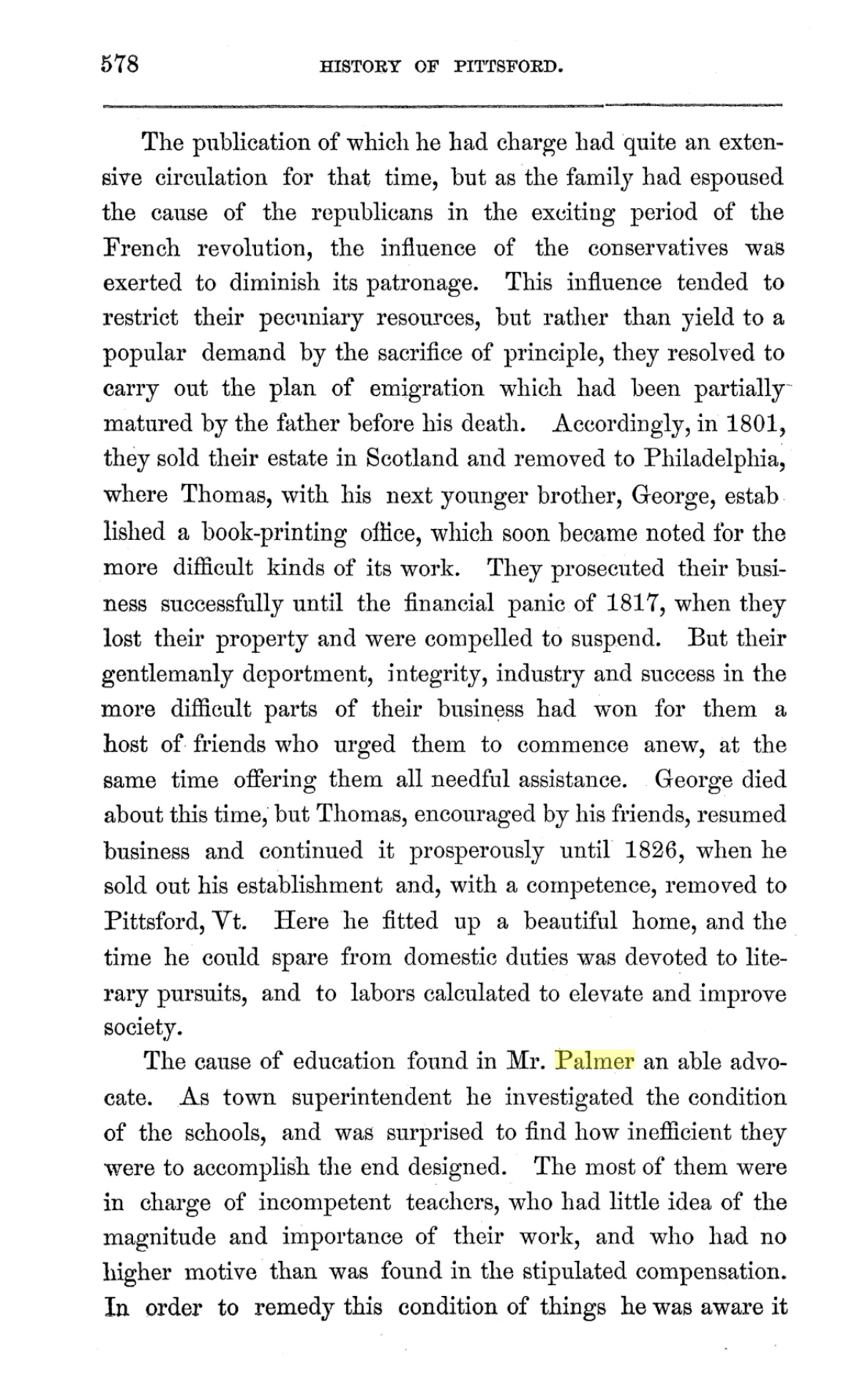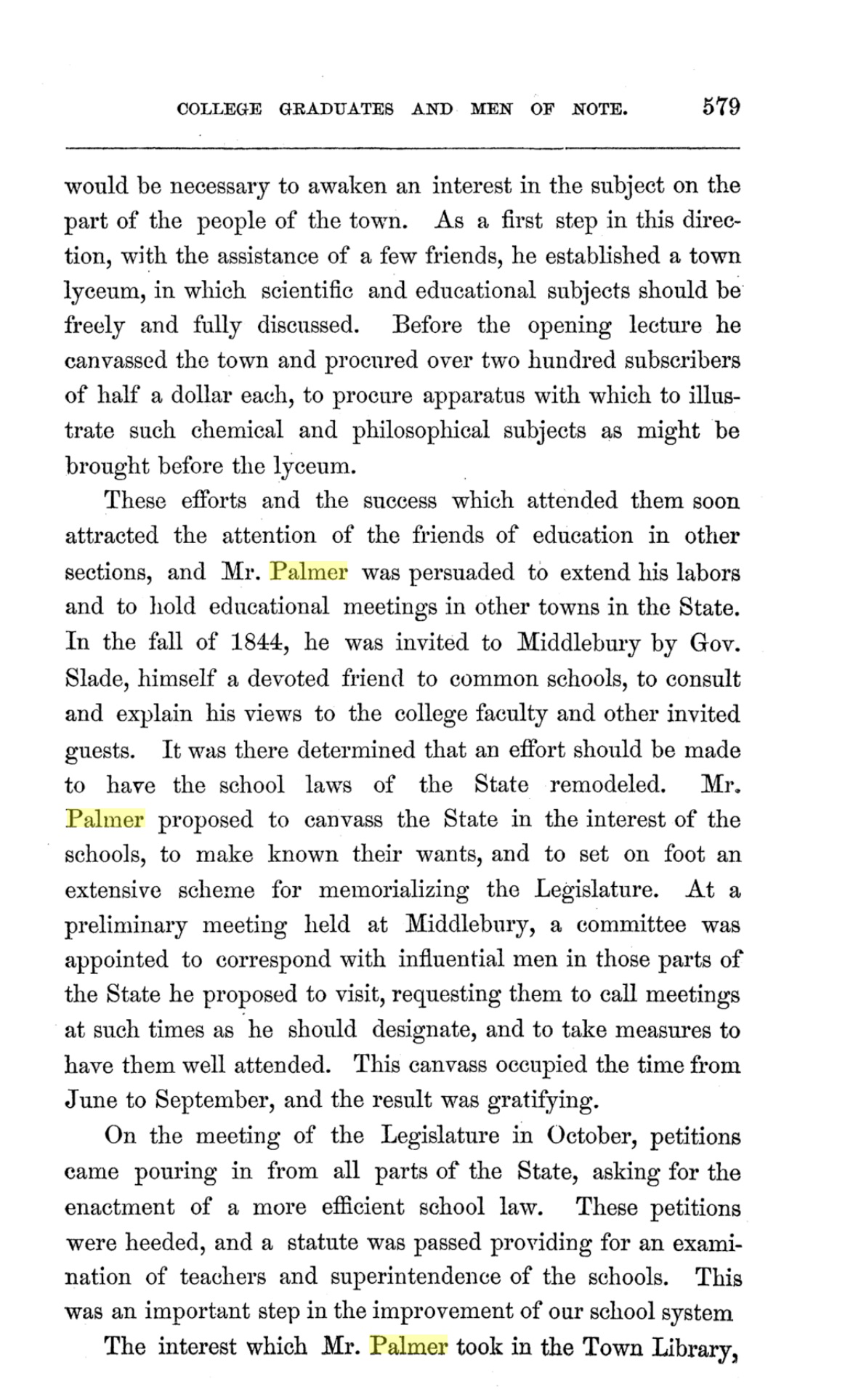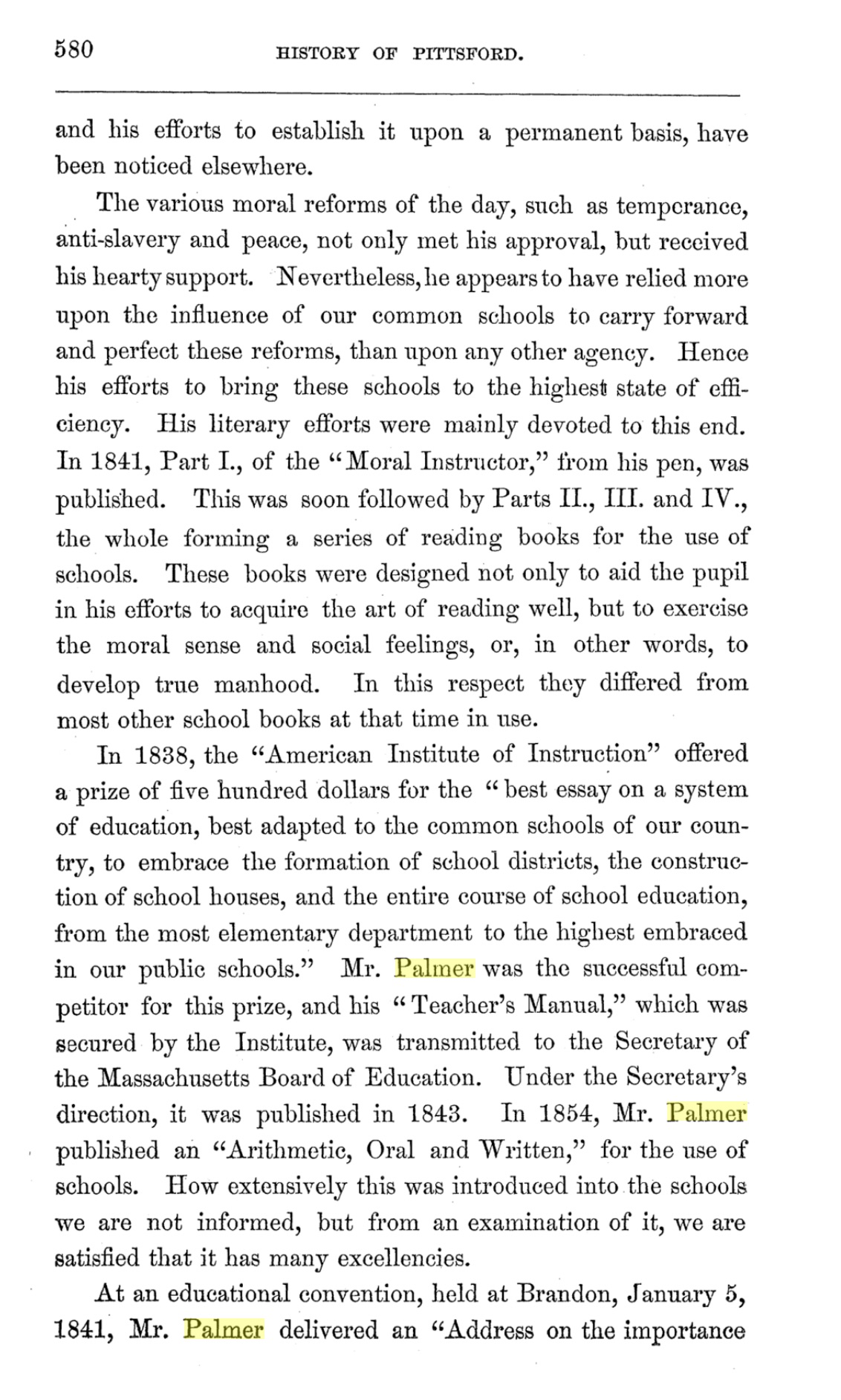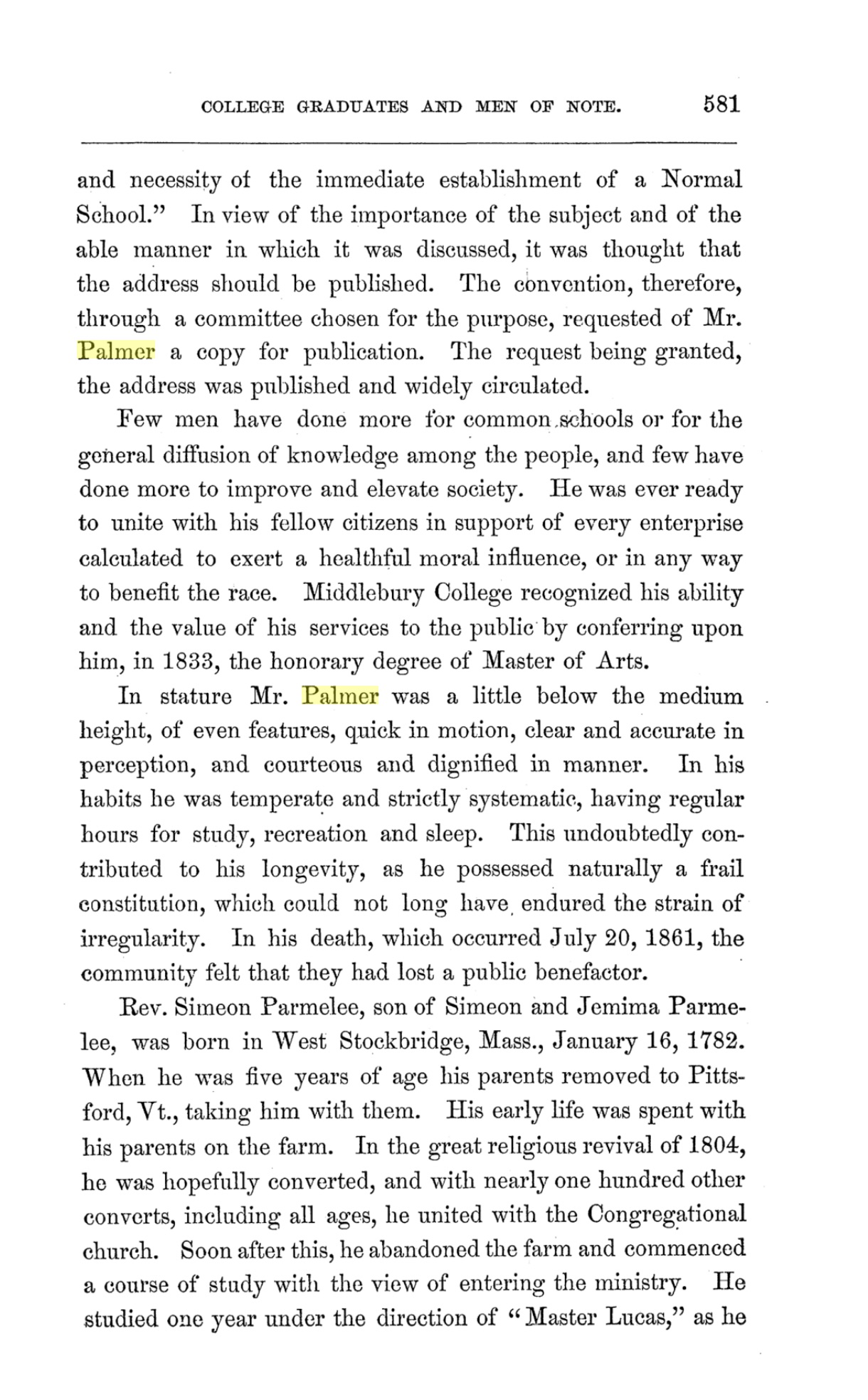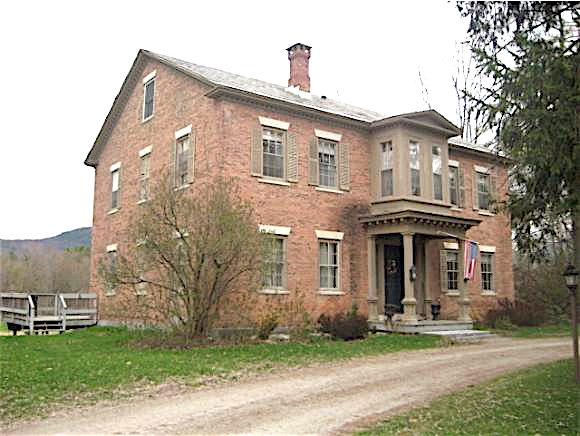
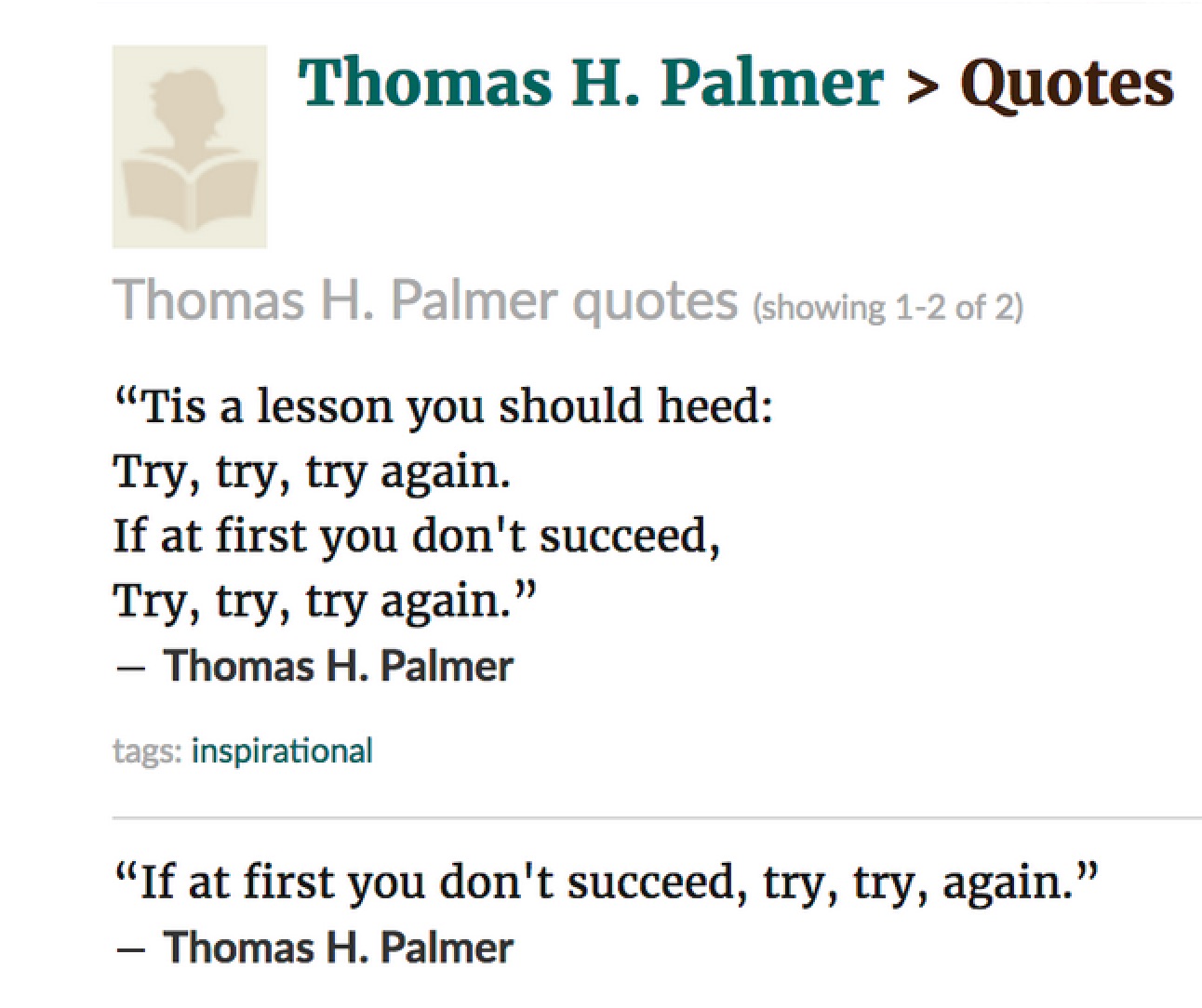
Palmer House https://en.wikipedia.org/wiki/Thomas_H._Palmer_House
Mary Elizabeth was born about 1836. She is the daughter of Thomas Palmer and Joanna Fenton. She died by drowning in a local stream when the ice gave way on her way home from school about 1850, and, of course was very much missed. She is buried in the family plot in Evergreen Cemetery, Pittsford.

I may be a descendant, but that doesn't mean I have to give this cat a good review. He's so preachy!
Surprised he was chatting with Madison and Jefferson who were much different.
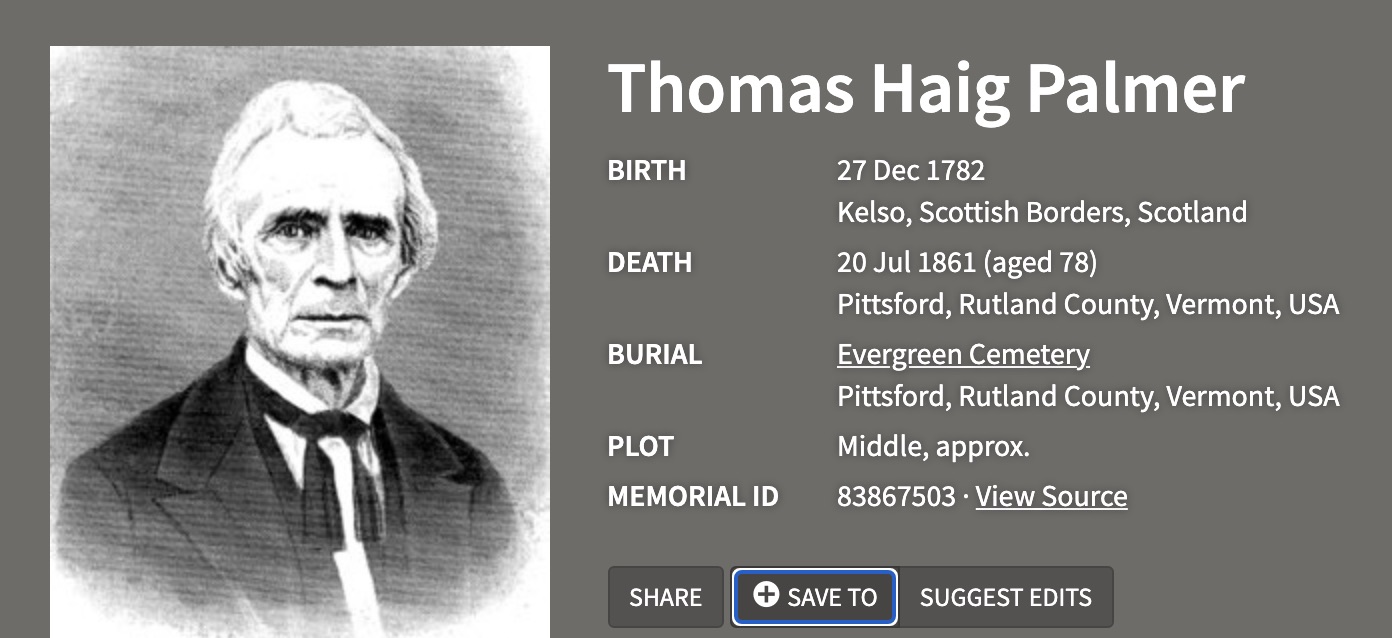
Thomas Haig Palmer Notes.jpg
He was forty when he married the 22-year-old Joanna....

Joanna Palmer Notes.jpg
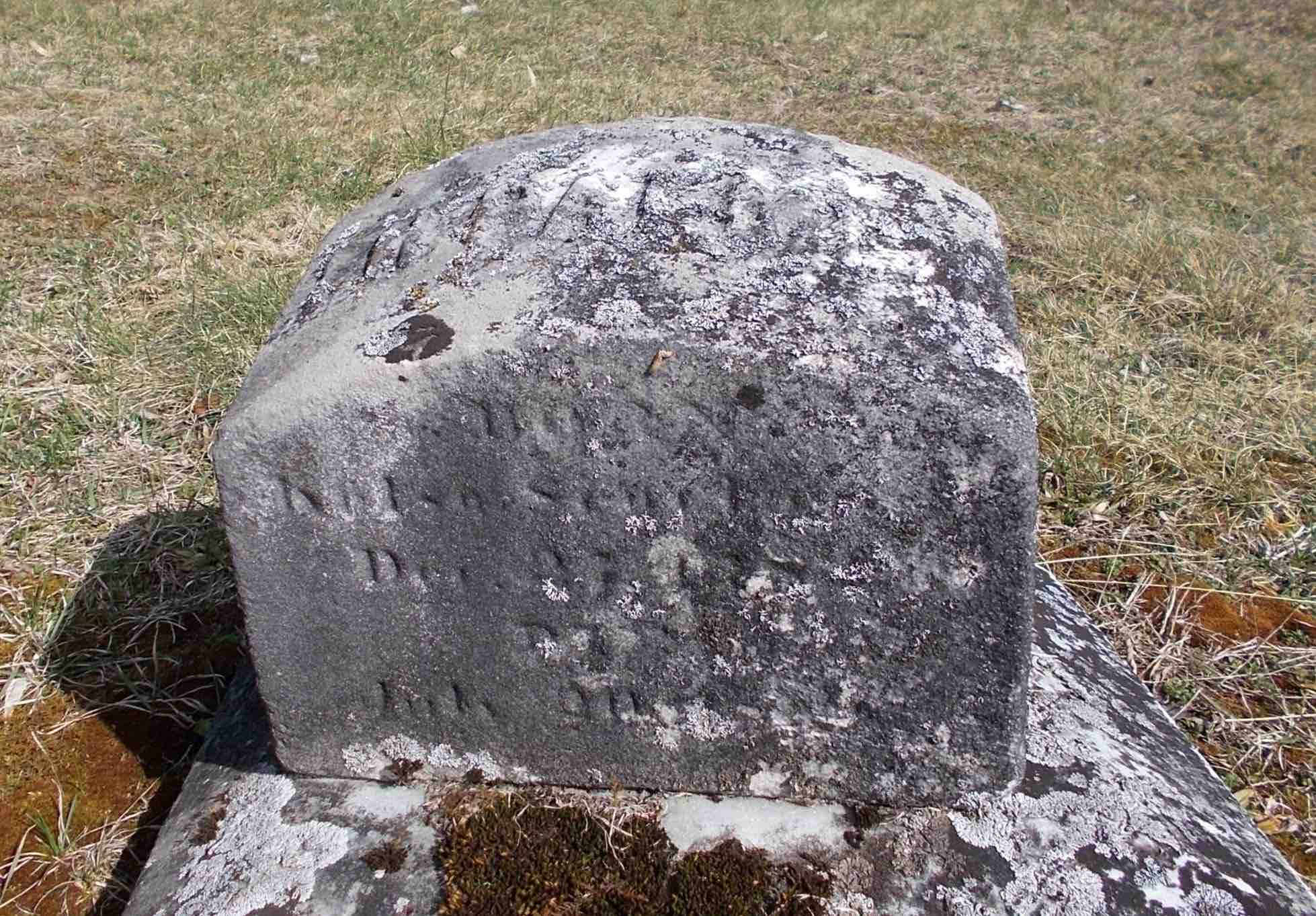
Thomas Haig Palmer's Gravestone.jpg
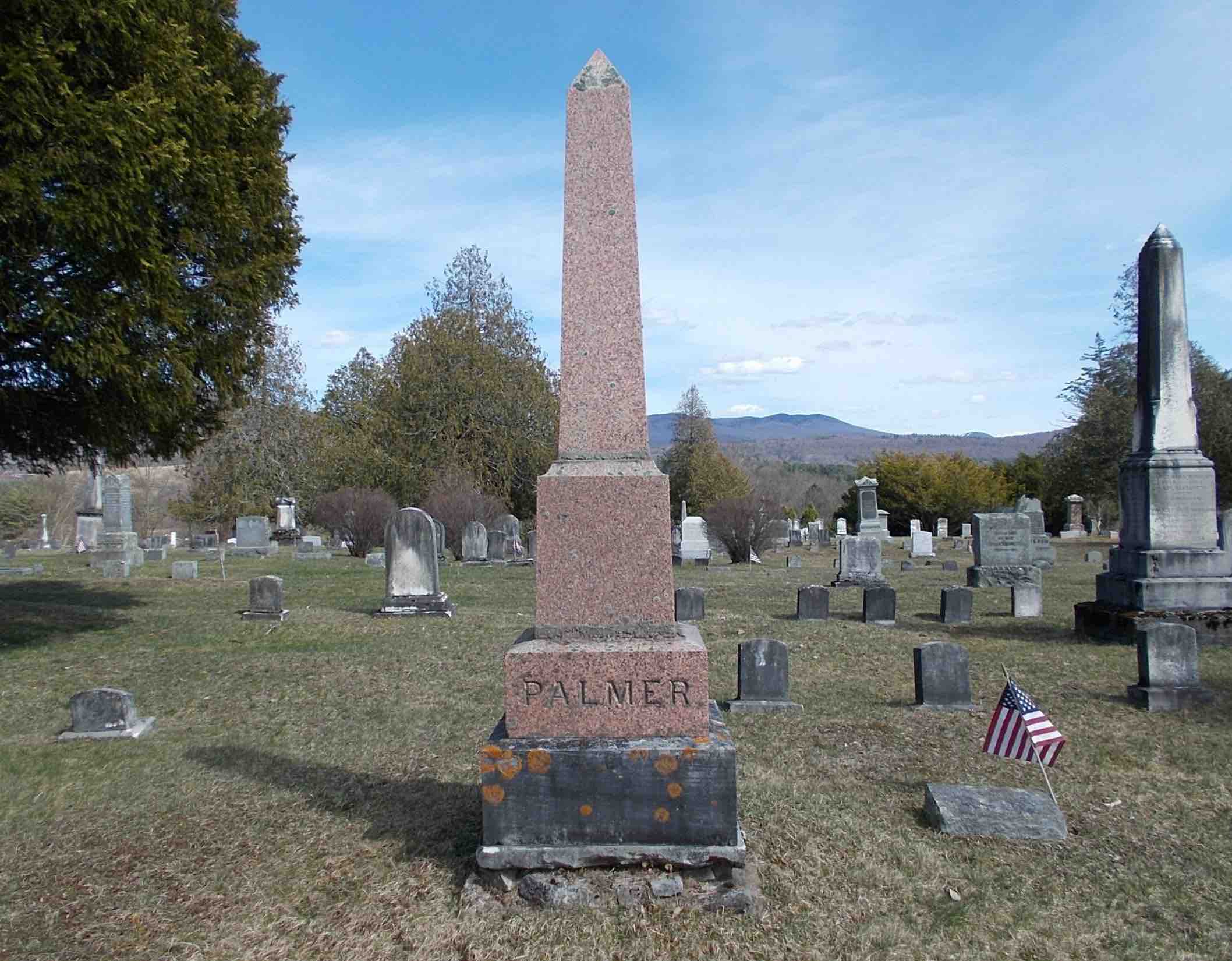
Palmer Family Gravestone.jpg
Thomas Haig Palmer
Birth: 27 Dec 1782 Kelso, Scottish Borders, Scotland
Death: 20 Jul 1861 (aged 78) Pittsford, Rutland County, Vermont, USA
Burial: Evergreen Cemetery, Pittsford, Rutland County, Vermont, USA
Plot: Middle, approx.
Memorial #: 83867503
Bio: Thomas migrated to Philadelphia with four siblings in 1804, as reported by Hemenway. He and his brothers, George and James Watt published and printed early American works; they were first to publish foreign language publications. One work was the U.S. Historical Register, for which Thomas would travel by coach to Washington during the War of 1812, to drop in on the president, or the Secretary of War across the street, to learn about the war. Family was set back and separated by the panic of 1817, and Thomas married Joanna Torrance Fenton (b. Georgia VT in 1800), and had two daughters born Philadelphia and sons and another daughter (who died young) born in Pittsford VT. Thomas was granted an honorary MA degree from Middlebury for his work in establishing teacher qualification standards thruout Vermont. He further initiated a World Peace Plan involving arbitration which was submitted to congress, but shelved by a Mississippi senator before the Civil War, which it might have prevented.
Family Members
Spouse
Joanna Torrance Fenton Palmer 1800-1872
Children
Sophia Watt Palmer 1823-1881
Mary Elizabeth Palmer 1827-1838
George Henry Palmer 1831-1900
James Neal Palmer 1833-1909
William Haig Palmer 1838-1899
Charles Edwin Palmer 1842-1906
Created by: Robert Palmer (47581074)
Added: 22 Jan 2012
URL: https://www.findagrave.com/memorial/83867503/thomas-haig-palmer
Citation: Find a Grave, database and images (https://www.findagrave.com : accessed 19 April 2021), memorial page for Thomas Haig Palmer (27 Dec 1782–20 Jul 1861), Find a Grave Memorial no. 83867503, citing Evergreen Cemetery, Pittsford, Rutland County, Vermont, USA ; Maintained by Robert Palmer (contributor 47581074) .
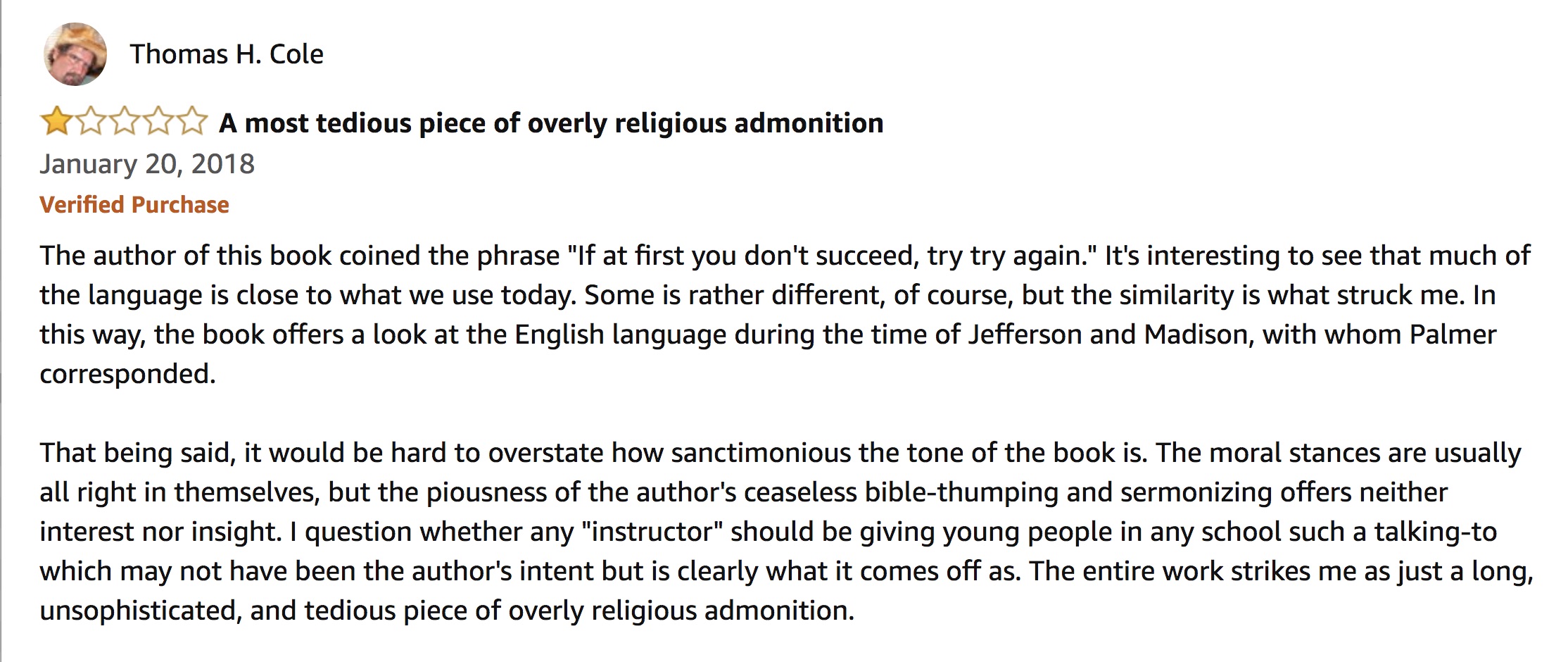
Here's just a random page:
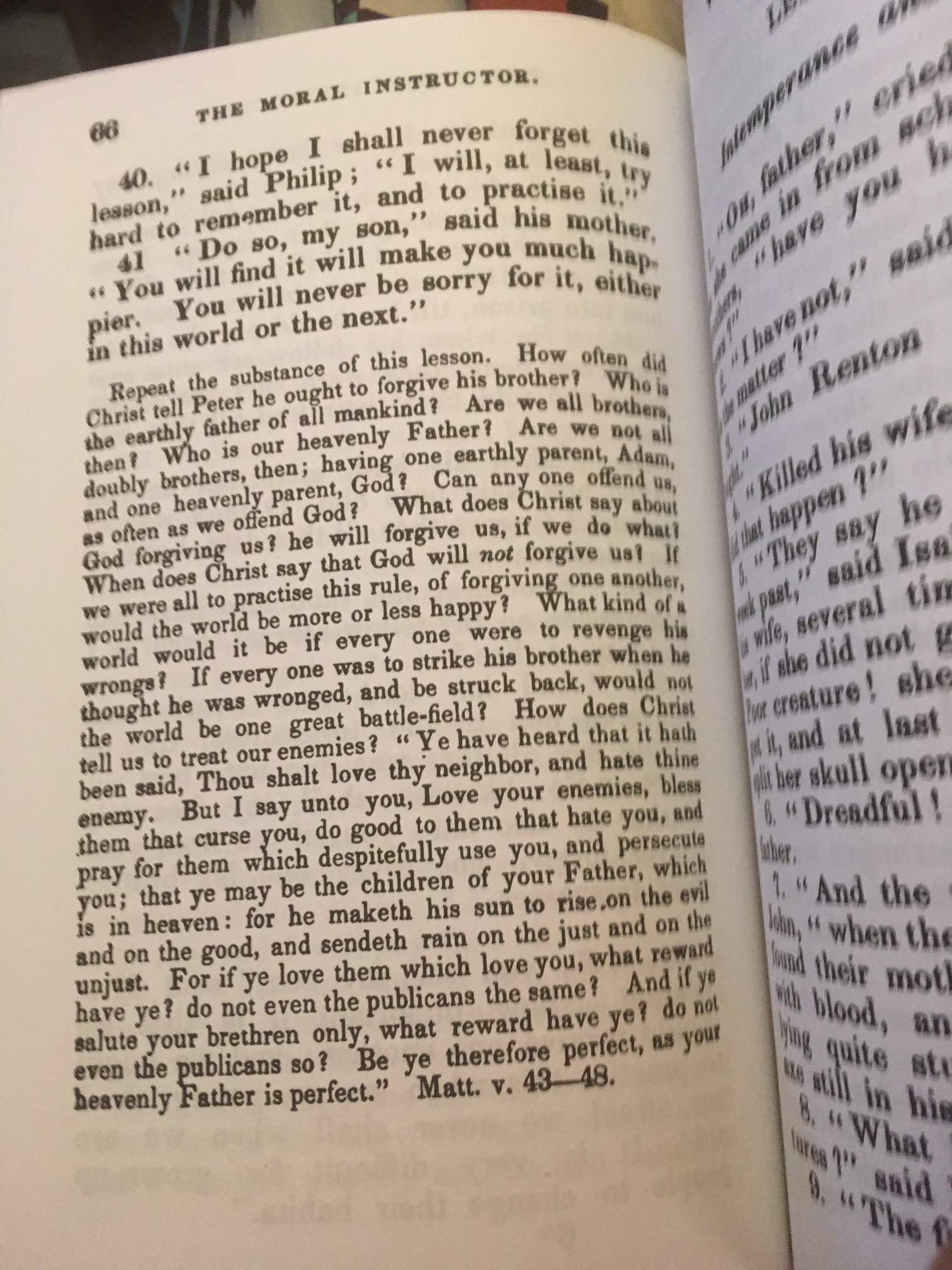
The Moral Instructor Inside Thomas Haig Palmer.jpg
Here's my copy:
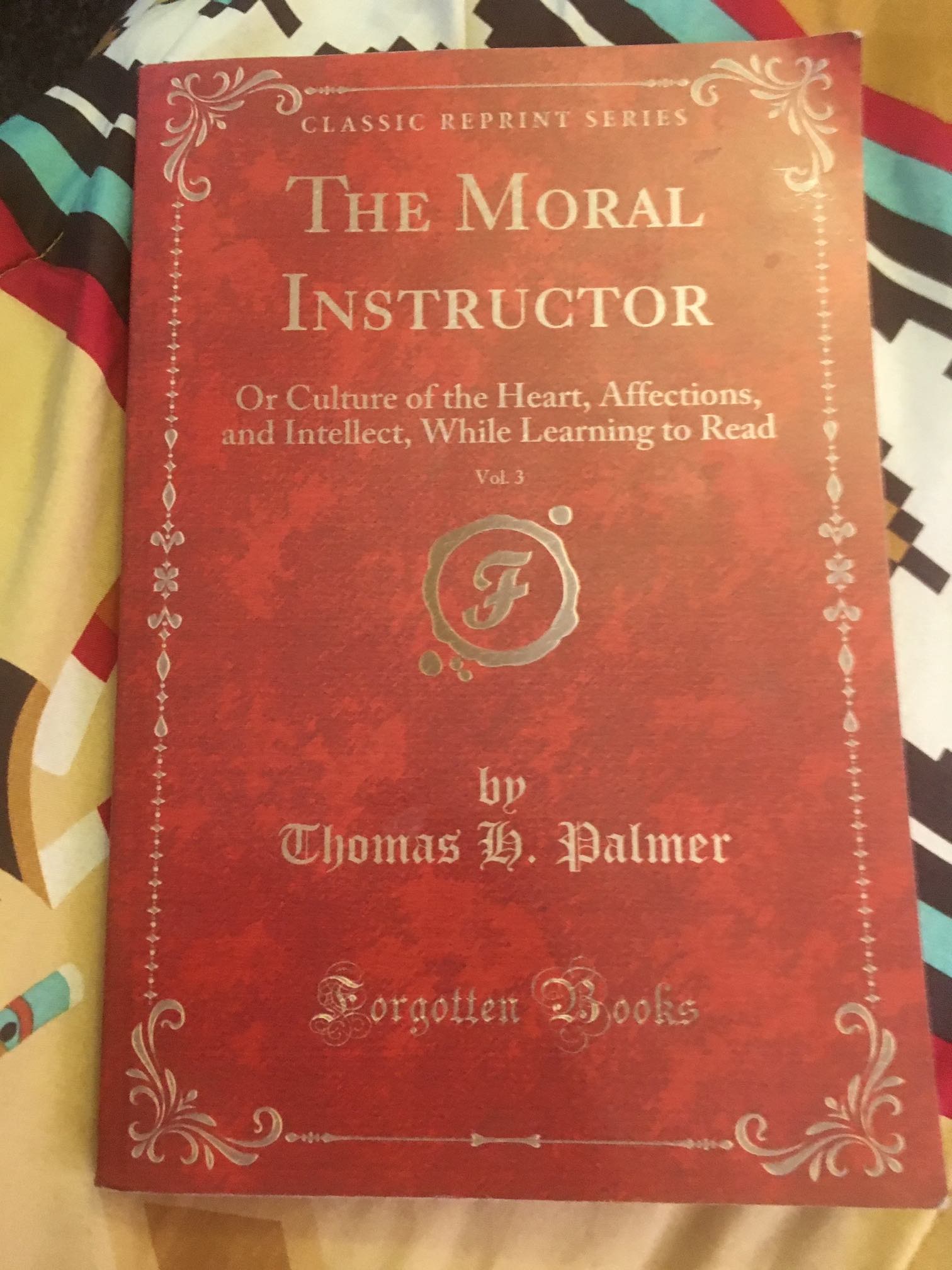
The Moral Instructor Cover Thomas Haig Palmer.jpg

Thomas H. Palmer to Thomas Jefferson, 22 February 1813From Thomas H. Palmer
|
Thomas landed in Philadelphia with two older sisters and two younger brothers in 1804, after their father died in England or Scotland. Eldest sister Christian married a recent Princeton graduate from Portsmouth New Hampshire, James Armstrong Neal, who became the 3rd pastor of the Greenland NH church; sister Margaret, became a music teacher and married John Jacob Parry the clockmaker, who had inherited his tools from the widow of one of the Rittenhouse brothers. The boys worked at printing and publishing as their father had in Kelso, Scotland. Thomas and brothers George and James Watt published in 1812-14 The U.S. Historical Register, an early description of U.S. geo-poliical definition, operating from 201 Chesnut(sic) Street, Philadelphia (near 5th and 6th Sts, today). Thomas traveled in all existing states at that time.
During the War of 1812, Thomas would take the two-day coach ride ($36) down to Washington to get the latest from the Secretary of War, himself. (The Pentagon then was two men, the Sec'y of War and his assistant). The White House was across the street, and if you desired you could go over to talk with the President, crossing the unpaved street. The brothers broke up following the financial panic of 1817, George going to New Orleans to die of tuberculosis, James Watt Palmer to Lexington, and later Louisville, Kentucky to sell books, printing and publishing early Kentucky almanacs.
After marrying Joanna Fenton at Rutland Mass. in 1822, Thomas returned with his bride to Philadelphia, and because of his excellent reputation there, quickly re-established himself as a printer/publisher. His first two daughters were born in Philadelphia, and Thomas soon retired from publishing, and, at his wife's choice, relocated near her family in Pittsford, Vermont. He later was appointed state superintendant of education for Vermont upon his stressing the need for examination of teachers, and later received an honorary MA degree from Middlebury College for this. He wrote a primer, The Palmer Arithmetic, and also The Moral Instructor, which were popular with schools at the time. Later he became involved in a world peace plan depending upon arbitration, which could have prevented the Civil War; it was shelved in Congress by a Senator Foote of Mississippi. Thomas was also instrumental in founding the first library for Pittsford by requesting aid in the form of matching funds from a Mr. McDowell of Mexico City. (This before Carnegie). He was selected by the town to go to Boston to purchase books for the new library.
Thomas is buried Evergreen Cemetery, Pittsford Vermont along with his widow Joanna, Geo Henry Palmer, Jennie Buel Palmer, James Neal Palmer, Sophia Watt Palmer, Grace L. Palmer, Helen Palmer, Florence Palmer (wife of H.L. Winter), Harry L. Winter, Charlie (small stone for young baby son of Charles Edwin Palmer who, himself is buried w/wife at Oak Park IL). LDS: Please do not attempt to ordain these people; they co-existed with church founders; had God wanted them to be Mormon, they would have made the trek out to Salt Lake City.
Sources
R. B. Palmer, June 2012 Vermont Gazetteer, Abby Maria Hemenway, Rutland, 1872.
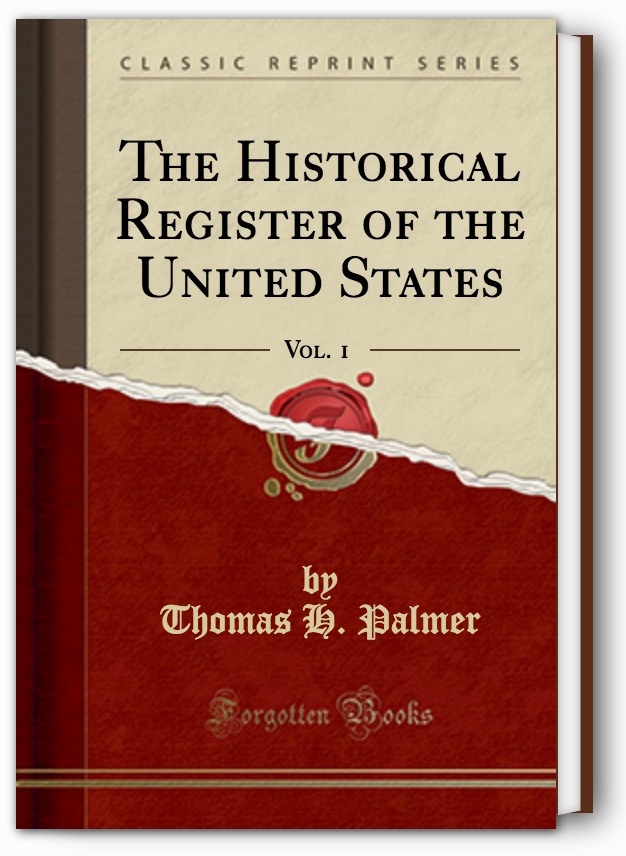
https://www.forgottenbooks.com/en/books/TheHistoricalRegisteroftheUnitedStates_10049112
Try, Try Again
’Tis a lesson you should heed,
If at first you don’t succeed,
Try, try again;
Then your courage should appear,
For if you will persevere,
You will conquer, never fear
Try, try again;
Once or twice, though you should fail,
If you would at last prevail,
Try, try again;
If we strive, ‘tis no disgrace
Though we do not win the race;
What should you do in the case?
Try, try again
If you find your task is hard,
Time will bring you your reward,
Try, try again
All that other folks can do,
Why, with patience, should not you?
Only keep this rule in view:
Try, try again.
-T. H. Palmer: “Teacher’s Manual” (1840), page 223
asdk
